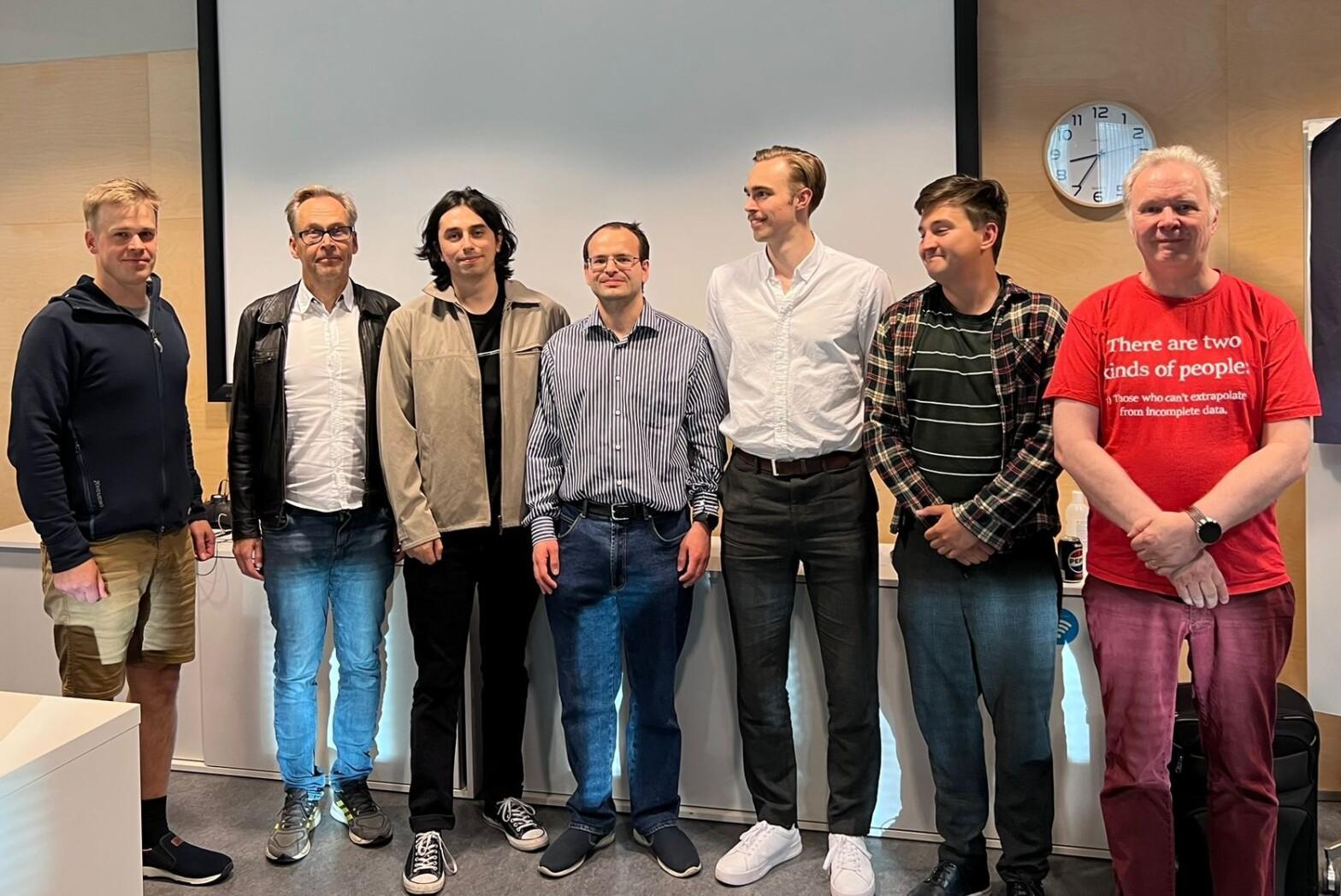Helsinki Python meetup with AI RAG and MariaDB Foundation

This is part of a blog series on the Helsinki Python meetup AI RAG Hackathon announced in March 2025. The winners were announced in May 2025: The Integration track winner was MCP, the Innovation track winner was YouTube Semantic Search, and runner-up Wikipedia Enhancer. We collected conclusions for future hackathons.
The Helsinki Python meetup on Tuesday 27th May was hosted by MariaDB Foundation with nearly 100 participants of the 2600+ members of the Helsinki python meetup community.
In addition to being a successful opportunity to mingle and learn python together, we finally got to announce the winners of the MariaDB AI RAG Hackathon! (winners posing in the feature photo of the blog)
Presentations: AI and MariaDB
We welcomed participants of the meetup with a brief introduction to what MariaDB is as a software, and the sponsoring parties: MariaDB Foundation, Open Ocean Capital and verkkokauppa.com.
The first presentation as by Jouni Seppänen presented on Experiences with The PocketFlow LLM Framework – an interesting alternative to bloated AI Frameworks. PocketFlow describes itself as “100-line LLM framework. Let Agents build Agents!!”.
Jouni Seppänen presenting on PocketFlow with MariaDB’s Monty listening
After the break Kaj Arnö from MariaDB Foundation presented on “MariaDB & Python: A Match?” discussing MariaDB from a python coder’s perspective including the MariaDB Connecter/python, MariaDB in relation to MySQL and PostgreSQL, as well as an introduction to MariaDB Vector. For the presentation’s questions part, MariaDB founder Monty stepped up to answer and got a round of applause for defending open source.
Kaj Arnö presenting on MariaDB & Python
Hackathon winner
Then it was time for the hackathon! This was a first for both the Helsinki Python meetup, and MariaDB Foundation in Finland. We were very happy with the engagement and results.
The hackathon was kicked off in March (see Join our AI Hackathon with MariaDB Vector) with two tracks: integration and innovation. The integration was about adding MariaDB Vector to existing AI Frameworks, and the innovation was about innovating applications using MariaDB Vector, most commonly in an AI RAG solution – creating role model applications to inspire others and serve as a place to copy from.
For those not familiar with vectors and AI RAG, Robert gave a brief explanation on what vectors make possible in AI applications. For more details see the blog Try RAG with MariaDB Vector on your own MariaDB data!.
The hackathon’s ideation phase (in March) attracted seven submissions. We had insightful discussions with each of them several times and saw great progress. At the end of the development phase (April), five final submissions were made – each consisting of a video demo and a public github repo.
We evaluated the submissions based on criteria 1) impact and 2) elegance of code.
Integration track Runner-up: DSPy
The integration track Runner-up was Kirill Ermolov for preparing an integration of MariaDB to the AI framework DSPy (Declarative Self-improving Python). Unfortunately, DSPy recently made a policy change to stop supporting community retrievers, which left Kirill’s pull request stranded and unmerged. We appreciate your efforts Kirill, and are thankful you took the time to work on the integration.
Integration track Winner: MCP
The integration track Winner was David Ramos for creating a MariaDB integration in MCP (Model Context Protocol). The integration showcases how the popular open standard MCP by Anthropic can be turned into a tool backed by MariaDB Vector. MCP is used by e.g. IDE Cursor AI to connect seamlessly with external tools, systems, and data sources.
David has made a great basic implementation, for MariaDB Vector. As for other aspects of MariaDB Server, the MCP Server will be further improved by MariaDB plc – with David Ramos’s work as the starting point. The repo README is clearly documented and Davis even provides tests. David has submitted his repo as a Pull Request into the MariaDB repo at https://github.com/mariadb/mcp. Great work David!
See David’s MCP demo video on Youtube (3:41).
Innovation track Runner-up: Wikipedia Enhancer
The innovation track runner-up was team Jens Stockmann & Viktor Sandbacka that developed “Wikipedia Enhancer”, a RAG solution for editing Wikipedia with an AI assistant. The use case’s starting point is entering an new source (e.g. a news article from yle.fi). The app then finds suitable Wikipedia article paragraphs (chunks) to improve with it, and generates improvement suggestions. Wikipedia runs on MariaDB, which is a nice complement.
User interface showing Wikipedia articles chunks “most relevant” to a news source given as input
Technically the solution is an end to end RAG implementation. All the way from fetching and chunkifying Wikipedia articles to providing Wikipedians a user interface with edit links into Wikipedia. Some more tweaks to the user interface and it could be in production helping Wikipedians making Wikipedia even better!
The repo resides at https://github.com/djstockma/wiki-rag-enhancer, and the demo video is here (6:17).
Innovation track Winner: Youtube Semantic Search
The innovation track winner was Dmytro Abramov with Youtube Semantic Search – “A semantic search application for YouTube videos based on captions.” The use case example was to make it easier to consume Python presentation videos (that are often long) by making it possible to search on numerous videos to find particular parts where a topic of interest is mentioned.
Preparational phase of embedding youtube video captions
Usage phase: search results of video segments “near” the search query
Technically the solution is a very nicely put together fully blown end to end RAG implementation. The documentation in the README is detailed and gives a good overview. We appreciate including details on how to prepare the caption texts before vectorizing them.
The repo resides at https://github.com/abramovd/yt-semantic-search, and the demo video is here (6:19).
Thank you!
Thank you to the Helsinki Python meetup for organizing the event, and all hackathon participants for participating during the past months.